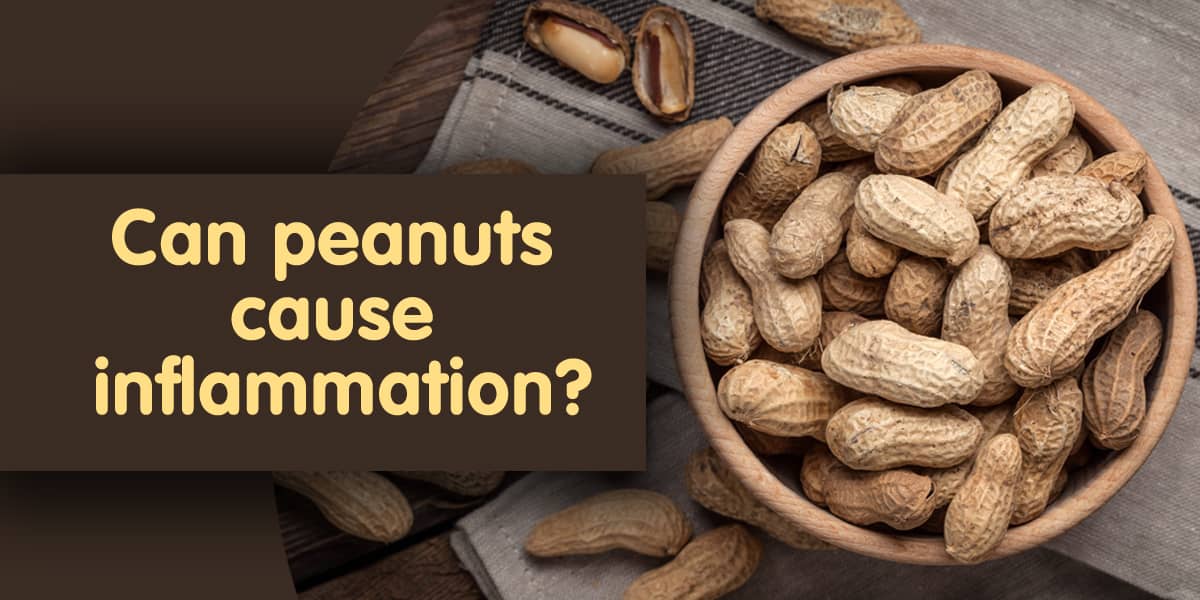Peanuts have many astonishing benefits, but is there an unknown side effect to eating peanuts?
One of my patients asked me anxiously if peanuts can cause inflammation. She read it in a book and peanuts were an essential part of her diet.
Well, many people claim peanuts to be inflammatory in nature. But in reality, peanuts do not cause inflammation. Rather certain studies have shown that peanuts have anti-inflammatory properties. Eating a handful of peanuts is a great way to meet the magnesium requirement of the body. A study showed that people with low magnesium intake are at a higher risk of inflammation.
But can there be smoke without some fire?
Why are so many ‘so-called’ experts claiming that peanuts cause inflammation?
Well, the claim that peanuts cause inflammation comes from the fact that peanuts are prone to moulds and fungi. This can result in inflammatory reactions. Even people who do not have an allergy to peanuts should practice caution against eating peanuts that has moulds or fungus.
What is Inflammation?
Inflammation is a silent killer. It is one of the major factors causing most modern chronic diseases ranging from arthritis to heart diseases to cancer and type 2 diabetes. Exposure to toxins like pollutants or allergens in food can result in inflammation.
Do peanuts cause inflammation?
Peanuts are a common snack item in every household. And why not? They are ladened with so many benefits. They help maintain your heart health, manage your body weight, boost brain power, and strengthen bones.
Though eating salted peanuts can have certain adverse effects because of the salt, unsalted boiled peanuts or dry roasted peanuts are the perfect doses of nutrition. However, peanuts are one of the most common food allergens. This is because they contain a compound called aflatoxins.
Aflatoxins are responsible for moulds in peanuts. So, people with serious inflammation and autoimmunity problems should avoid peanuts. Similarly, peanut butter is also processed and highly synthetic, so it is either better to avoid it or opt for organic and homemade peanut butter prepared without processing.
Aflatoxins and inflammation
Aflatoxins are a family of toxins that produce different species of mould. This toxin is marked as carcinogenic and can stimulate an inflammatory reaction. That’s why it is important to keep the peanuts in an airtight container and check for moulds.
Many healthy foods contain traces of this toxin including figs, nuts, and quinoa. It is always better to eat them fresh and store them right. Else, there are other alternatives like chia seeds and flax seeds for extra protein and antioxidants. Chia seeds are rich in protein, fiber, and calcium and contain a happy balance of omega3 and omega-6 fatty acids!
Processed peanuts
Certain items made with peanuts like peanut butter are highly processed. They are ladened with additives and trans fats. Also, highly processed nuts lose their nutritive quality. Thus, it is always a good idea to eat raw and organic peanuts stored in a proper way.
Other foods that can cause inflammation –
Sugar
Studies revealed that sugar triggers the release of inflammatory messengers called cytokines. Eating foods high in sugar or carbonated and canned beverages that contain a high amount of sugar can lead to inflammation and inflammatory diseases.
Saturated Fats
Studies have shown that saturated fats can trigger inflammation, which is an indicator of heart disease and arthritis. Western foods like pizza, pasta, and cheese are high in saturated fats. Other foods like meat products and full-fat dairy products are rich in saturated foods.
Trans Fats
Trans fat found in fast foods and other fried products, processed snack foods, frozen breakfast products, and cookies is also known to cause inflammation. Avoid foods with partially hydrogenated ingredient labels.
Omega 6 Fatty Acids
Excess consumption of omega-6s can trigger pro-inflammatory chemicals. Foods like corn, safflower, sunflower, grapeseed, soy, and mayonnaise contain omega-6 fatty acids.
Refined Carbohydrates
Another known inflammatory food is the refined carbohydrates found in white rice, white potatoes, rolls, and bread. These foods are high in glycaemic index and they are proven to stimulate inflammation.
Your Takeaway
Peanuts do not cause inflammation when consumed in the right way. However, it is essential to store them in the right way. Avoid eating old peanuts that contain mold or fungus. You can eat a handful of peanuts every day without any guilt. Just opt for dry-roasted peanuts or boiled peanuts that will bring you the benefits without the side effects.
Also Read:


2 comments
[…] Peanuts are one of the most delicious and healthiest snacks but can peanuts raise your cholesterol levels? […]
[…] need, consuming too much omega-6 in proportion to omega-3 (found in foods like fish and flaxseed) may promote inflammation and potentially raise cholesterol. Aim for a balance of different healthy […]